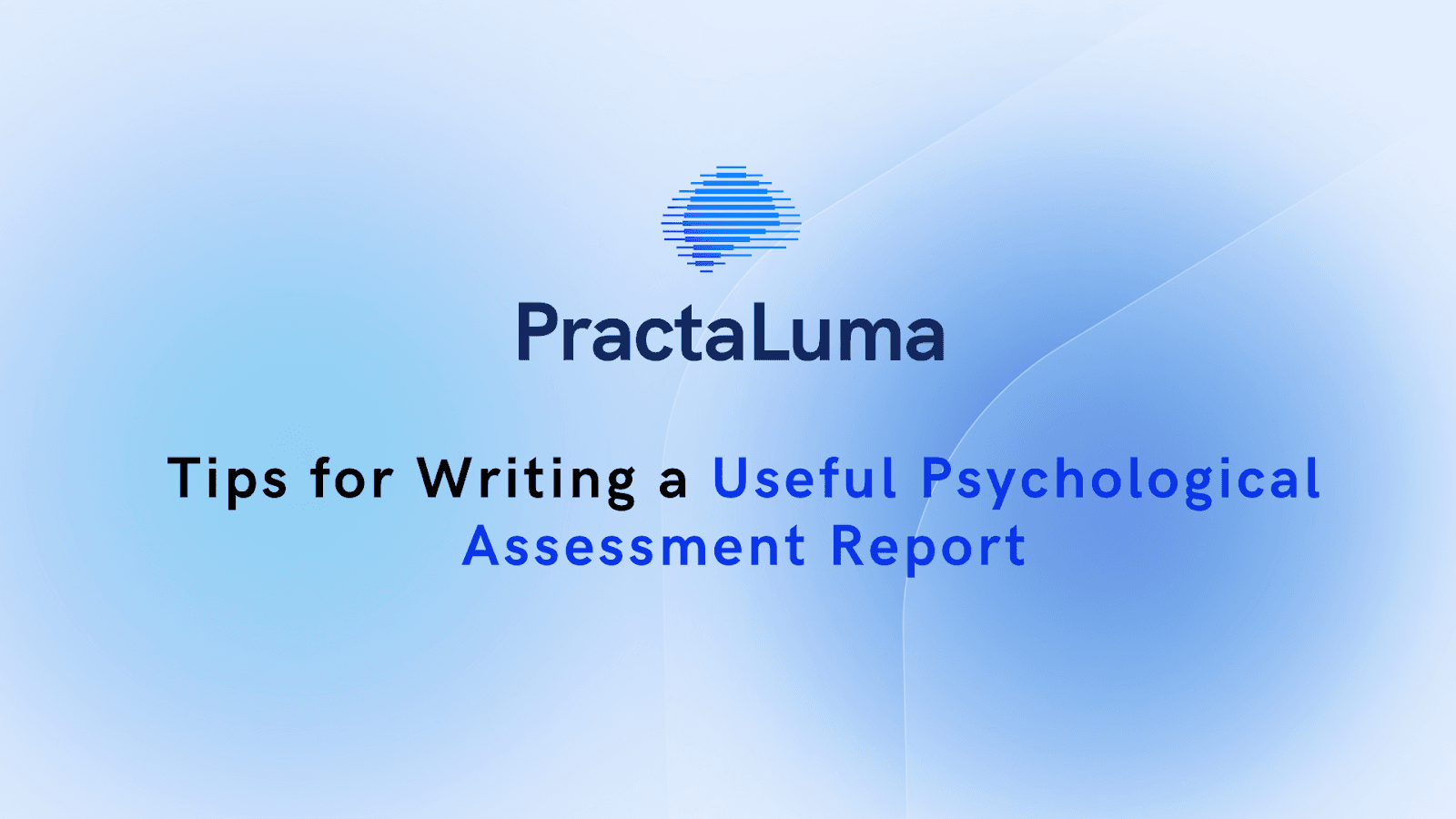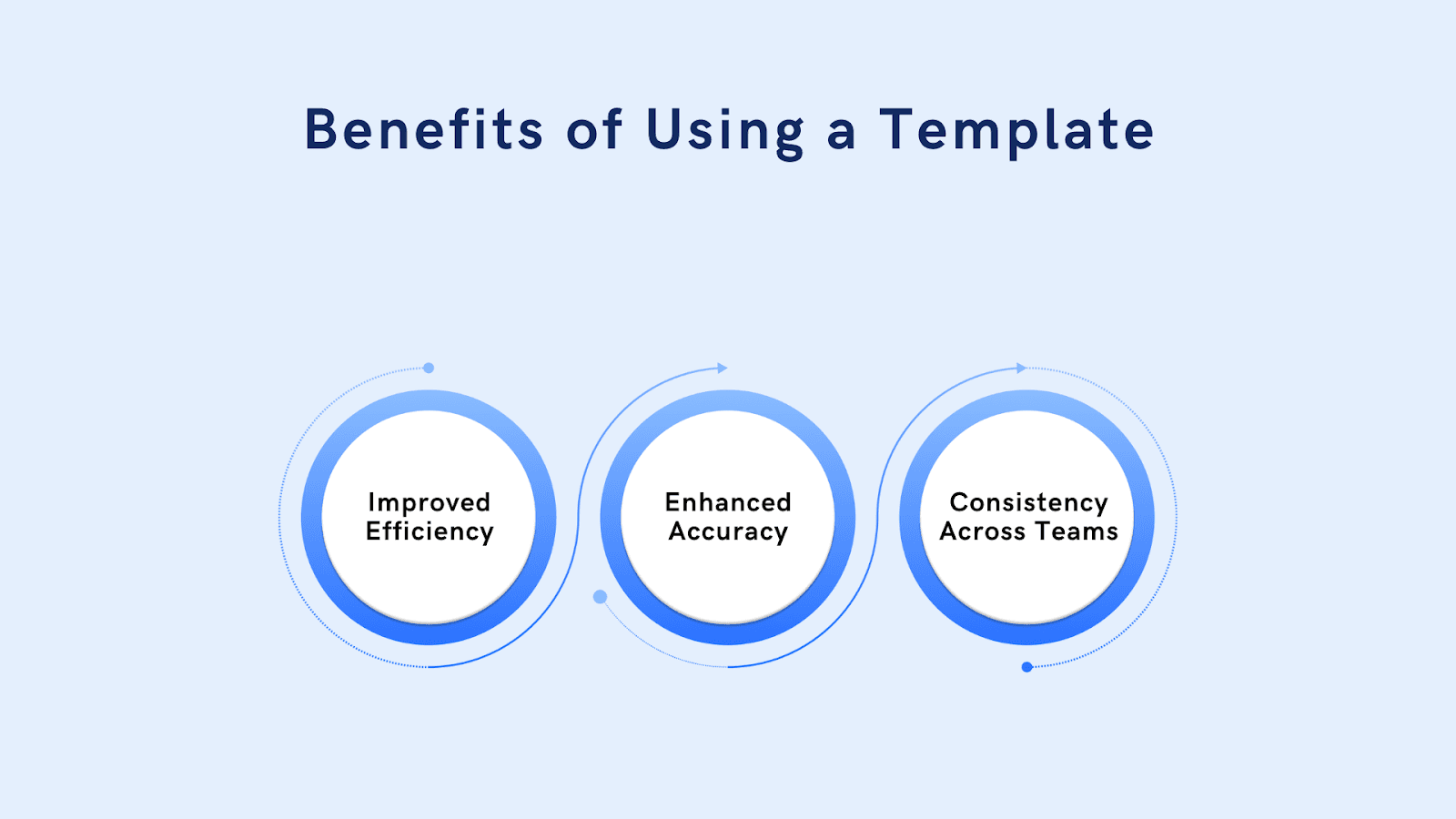
1 April 2025
Tips for Writing a Useful Psychological Assessment Report
"Did you know that the clarity of a psychological assessment report can significantly influence treatment outcomes?"
Research shows that unclear treatment goals are associated with poorer outcomes and increased treatment dependency.
A well-structured report guides effective interventions and enhances collaboration among healthcare professionals. For instance, the National Institute of Mental Health (NIMH) also emphasises the importance of clear communication in psychosocial research to improve mental health treatments.
By crafting insightful and actionable reports, you bridge the gap between assessment and effective intervention, benefiting patient care. Ready to refine your reporting skills? Let's explore practical tips to enhance your psychological assessment reports.
1. Creating a Template for Psychological Reports
Using a consistent template for psychological reports is a game-changer for healthcare professionals. Templates streamline the report-writing process, ensuring efficiency, accuracy, and uniformity across cases. They save time and reduce the risk of missing critical details, which is essential in professional environments where precision matters.
Benefits of Using a Template

- Improved Efficiency: A standardised structure eliminates repetitive formatting, enabling you to focus on clinical insights rather than administrative tasks.
- Enhanced Accuracy: Templates reduce the likelihood of errors or omissions, ensuring every assessment meets professional standards.
- Consistency Across Teams: When multiple clinicians use the same format, reports are more accessible to review and share, fostering better collaboration and continuity of care.
Implementing Templates in Software
Modern software solutions make it easy to integrate templates into daily practice:
- AI-Powered Assessment Platforms: Tools like Practaluma’s AI-driven software enable seamless template customisation, ensuring they are tailored to your unique reporting and assessment needs.
- Electronic Health Record (EHR) Systems: Many EHR platforms allow customisation of report templates, ensuring they align with your clinical needs.
- Word Processing Tools: Applications like Microsoft Word or Google Docs support template creation with editable fields for flexibility.
- Dedicated Assessment Tools: Platforms like Practaluma can help you design and implement bespoke templates tailored to your reporting requirements.
By adopting standardised templates, you enhance the quality and efficiency of your psychological reports, creating a seamless process for delivering valuable insights.
The following section will examine the key elements contributing to an effective psychological report and how to implement them in your practice.
2. Data Collection Techniques

Accurate data collection is essential for reliable psychological assessment reports. The quality of the data you gather directly influences your analysis and recommendations, ensuring they are actionable and trustworthy.
Psychological Tests and Their Importance
Standardised psychological tests, such as the Minnesota Multiphasic Personality Inventory (MMPI), provide structured data for objective assessments. These tests are rigorously validated, ensuring their reliability in clinical settings.
- Reliability: Tests like the WAIS have been extensively validated to measure their intended purpose, providing reliable data for decision-making.
- Consistency: Using consistent tools across assessments allows for tracking progress and adjusting treatment plans.
3. Enhancing Data Collection with Technology
Digital tools can enhance both the accuracy and speed of data collection.
- Auto-complete Forms: Many modern tools include auto-complete features to reduce human error and speed up the data entry process.
- Digital Assessment Tools: Platforms such as Practaluma streamline data collection with customisable forms and built-in error checks, ensuring consistency and reliability.
Incorporating these techniques improves data accuracy and creates more efficient, reliable psychological reports. We’ll also discuss effectively interpreting and presenting the collected data.
Interpreting and Integrating Test Results
Interpreting psychological test results is a critical skill that transforms raw data into meaningful insights. Combining quantitative data, such as test scores, with qualitative observations ensures a holistic understanding of the patient’s condition, leading to more effective treatment plans.
Techniques for Accurate Interpretation
- Standardised Scoring: Ensure you use established norms for interpreting test scores, such as T-scores or percentiles, to make objective comparisons. For example, tools like the MMPI offer standardised scoring systems to help clinicians assess psychological conditions reliably.
- Contextual Analysis: Quantitative results and qualitative data, such as behavioural observations or patient history, must be considered to capture the complete clinical picture.
The Value of Combining Data
Integrating multiple data types ensures that your conclusions are robust and actionable. According to a study by the NLM, clinicians who use a blend of data sources report a 25% improvement in diagnostic accuracy. For instance:
- Quantitative Data: Provides measurable benchmarks and allows for comparisons across populations.
- Qualitative Insights: Add depth by highlighting unique individual traits or situational factors.
Streamlining Data Integration
Advanced tools can simplify the integration process:
- Digital Platforms: Software like Practaluma enables seamless integration of multiple data types into a single report.
- Automated Summaries: These tools can generate summaries, highlighting critical findings for quicker analysis and presentation.
By mastering the interpretation and integration of test results, you ensure your reports are insightful, actionable, and tailored to your patients’ needs.
Let us look at how to present these results effectively to other professionals and stakeholders.
4. Ensuring Report Readability
A well-written psychological assessment report balances detail with clarity, ensuring the content is accessible to its intended audience. Whether addressing clinicians, educators, or families, adapting the language and structure to suit their needs is essential for effective communication.
Critical Principles for Readable Reports
- Clarity and Conciseness: Avoid jargon when unnecessary, and use straightforward language. According to NIH guidelines, clear communication enhances comprehension and reduces misinterpretation by 40%.
- Audience Adaptation: Tailor your tone and terminology based on the reader:
- For Clinicians: Use precise, technical language to convey diagnostic findings and recommendations.
- For Families: Simplify terms, focusing on actionable insights and practical advice.
- Logical Structure: Organize the report with headings, bullet points, and short paragraphs to make it skimmable and easy to reference.
Strategies for Improved Readability
- Limit Complexity: Break down intricate findings into digestible sections.
- Use Visual Aids: Charts or tables can make quantitative data easier to grasp.
- Edit Thoroughly: Proofread to eliminate redundancies and ensure every sentence adds value.
By prioritising readability, you make your reports more practical and actionable for everyone involved in a patient’s care.
5. Developing a Report Narrative
Creating a cohesive narrative in psychological assessment reports is crucial for transforming raw data into a meaningful and actionable story. A well-crafted narrative ties together test results, observations, and recommendations, providing clarity for clinicians and other stakeholders.
Tips for Integrating a Narrative Style
- Start with the Big Picture: Begin with an overview of the patient’s background, presenting problems, and the purpose of the assessment.
- Connect Findings: Relate test results to specific behaviours, symptoms, or concerns the referral highlights.
- End with Actionable Steps: Conclude with clear, prioritised recommendations that relate to the narrative’s key themes.
Example:Rather than stating, "The patient scored low on attention tests," integrate it into the story: "The patient’s low scores on attention-related tasks are consistent with the reported difficulties in maintaining focus at school and home, suggesting potential ADHD that warrants further exploration."
Streamlining Narratives with Technology
Digital platforms like Practaluma can simplify the process of creating impactful narratives. These tools help organise data, integrate findings into cohesive summaries, and ensure your reports deliver actionable insights efficiently.
6. Considerations for Ethical and Professional Standards
Adhering to ethical and professional standards is fundamental in psychological assessment reporting. Reports must reflect accuracy, impartiality, and compliance with legal and professional guidelines to uphold the integrity of the field and ensure patient trust.
Essential Ethical and Professional Norms
- Confidentiality: Safeguarding patient information is paramount. According to the Australian Psychological Society’s Code of Ethics, psychologists must ensure that all data shared in reports respects privacy laws, such as Australia’s Privacy Act 1988.
- Objectivity: Reports should present findings without bias, relying solely on validated data and evidence-based interpretations. Subjective assumptions can compromise the credibility of conclusions and recommendations.
- Informed Consent: Before assessments, practitioners must obtain explicit consent from patients or their guardians, ensuring they understand the purpose and potential outcomes of the evaluation.
Maintaining Professional Integrity
- Impartial Reporting: Avoid letting personal beliefs or external pressures influence findings. Reports should focus on presenting data-driven insights aligned with ethical practices.
- Cultural Sensitivity: Tailor assessments and interpretations to account for cultural and contextual factors to avoid misrepresentation.
- Compliance with Legal Standards: Reports must adhere to jurisdictional regulations, such as those outlined by governing bodies like the Psychology Board of Australia (PsyBA) or similar authorities globally.
The Impact of Ethical Reporting
Ethical lapses in reporting can lead to significant consequences, including misdiagnoses, legal repercussions, and damage to professional reputations.
7. Recommendations and Directions
The recommendation section of a psychological assessment report is critical for translating findings into actionable interventions. Clear, evidence-based recommendations provide a roadmap for treatment, education, or further evaluation, ensuring stakeholders can make informed decisions.
Crafting Effective Recommendations
- Tailored Interventions: Base recommendations on specific assessment findings. For example, if test results indicate ADHD, suggest evidence-based approaches like behavioural therapy or academic accommodations. Studies from the National Institute of Mental Health show that individualised plans improve treatment outcomes by up to 35%.
- Prioritise Action Steps: Organize recommendations from most to least urgent, helping stakeholders focus on immediate needs.
- Consider Future Directions: Highlight areas for further exploration, such as additional diagnostic tests, therapy sessions, or environmental changes.
Structuring Recommendations
- Be Specific: Use direct, actionable language, such as, “Implement a daily routine with visual schedules to support executive functioning.”
- Link to Evidence: Reference relevant research or guidelines to back up your suggestions.
- Adapt for the Audience: Frame recommendations differently for clinicians, educators, or families to ensure clarity and relevance.
Directing Future Considerations
- Follow-Up Assessments: Suggest periodic evaluations to monitor progress and adjust interventions as needed.
- Collaborative Planning: To create a holistic approach and encourage coordination with other professionals, such as educators or occupational therapists.
- Patient-Centered Goals: Emphasize long-term goals that align with the individual’s unique needs and circumstances.
You empower stakeholders to take confident steps toward improving outcomes by offering clear, actionable recommendations.
Conclusion
Crafting a helpful psychological assessment report requires a balance of clarity, precision, and professionalism. By focusing on clear communication, accurate data interpretation, and structured writing, you can create insightful, actionable reports tailored to diverse stakeholders' needs.
Enhance your practice with Practaluma's tailored solutions for streamlined psychological assessment reporting. Explore the services today to deliver professional, impactful reports.
- Seamless Calendar Sync: Integrate with Google, Outlook, Teams, Zoom, and EHR.
- Instant Transcripts: Convert session recordings and handwritten notes into professional formats.
- Custom Reports: Generate tailored Autism and ADHD assessment reports.
- Document Organization: Securely manage all client files in one place.
- HIPAA-Compliant Security: Ensure data safety with encryption and MFA.
- AI-Powered Insights: Search and find answers across all your documents instantly.